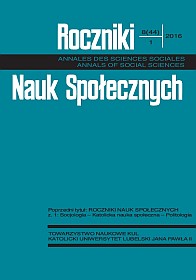Islamic State – a State or non-State Actor?
Abstract
Islamic State, as the name suggest, is going to be perceived and treated not as a mere terrorist organization, but rather as a caliphate, Islamic state. In the last decades many violent non-state actors have propagated the idea of caliphate but none of them have never accomplished the idea. Islamic State can be treated as the first organization, which declare and what is more important create state structures, responsible for administrating conquered territory. To some extent Islamic State fulfills thecriteria for statehood listed in the Montevideo Convention on the Rights and Duties of States, 1933. But the basic question is whether it can be recognized as a state in the light of international law?
References
Crowcroft O.: Isis: Worst refugee crisis in a generation as millions flee Islamic State in Iraq and Syria, http://www.ibtimes.co.uk/isis-worst-refugee-crisis-generation-millions-flee-islamic-state-iraq-syria-1506613 [dostęp: 20.09.2016].
Dziekan M.: Arabowie. Słownik encyklopedyczny, Warszawa: Wydawnictwo Naukowe PWN 2001.
ISIS allegedly issues `caliphate' passport, http://english.alarabiya.net/en/News/middle-east/2014/07/05/ISIS-allegedly-issues-caliphate-passport.html [dostęp: 24.09.2016].
Johnson K.: The Islamic State Is the Newest Petrostate, „Foreign Policy”, http://www.forei gnpolicy.com/articles/2014/07/28/baghdadis_hillbillies_isis_iraq_syria_oil_terrorism_islamic _state [dostęp: 05.10.2016].
Johnson P.: The current spasm in Islam, „Forbes” 194(2014), s. 30.
Jones S.G.: A Persistent Threat The Evolution of al Qa'ida and Other Salafi Jihadists, Santa Monica 2014.
Konwencja o prawach i obowiązkach państw, Montevideo 1933, w: Źródła do historii powszechnej okresu międzywojennego, red. S. Sierpowski, t. II: 1927–1934, Poznań: Wydawnictwo Uniwersytetu Adama Mickiewicza 1992, s. 482-486.
Kosienkowski M.: Quasi-państwo w stosunkach międzynarodowych, „Stosunki Międzynarodowe-International Relations” 38(2008), nr 3-4, s. 1.
Lister Ch.: Profiling the Islamic State, „Brookings Doha Center Analysis Paper” 2014, s. 28.
Mahadeven P.: The neo-caliphate of the „Islamic State”, „CSS Analyses in Security Policy” 166(2014), s. 2.
Malas N., Abi-Habib M.: Islamic State Fills Coffers From Illicit Economy in Syria, Iraq, „The Wall Street Journal”, http://online.wsj.com/articles/islamic-state-fills-coffers-from-illicit-economy-in-syria-iraq-1409175458 [dostęp: 02.10.2016].
Otłowski T.: Lider Państwa Islamskiego nie żyje? Jego śmierć może nieoczekiwanie wzmocnić siły dżihadystów, http://wiadomosci.wp.pl/kat,1356,title,Lider-Panstwa-Islamskiego-nie-zyje-Jego-smierc-moze-nieoczekiwanie-wzmocnic-sily-dzihadystow,wid,175 11751,wiadomo sc.html?ticaid=115224&_ticrsn=3 [dostęp: 05.09.2016].
Ożarowski R.: Specyfika zmilitaryzowanego aktora niepaństwowego we współczesnych stosunkach międzynarodowych. Przypadek Hezbollahu, „Przegląd Strategiczny” 1(2012), s. 204.
Ponikowski B.: Kwestia państwa we współczesnej myśli politycznej, „Studia z teorii polityki” 2(1998), s. 53-78.
Potyrała A.: Unia Europejska wobec nowych tworów państwowych (Casus Kosowa, Abchazji i Osetii Południowej), „Środkowoeuropejskie Studia Polityczne” 1(2010), s. 17.
Rotberg R.I.: Failed States, Collapsed States, Weak States: Causes and Indicators, w: When States Fail: Causes and Consequences, ed. R.I. Rotberg, Princeton: Princeton University Press 2004, s. 10.
Shanker T.: Qaeda leaders in Iraq neutralized, U.S. commander says, „New York Times” 2010, s. A5.
Valensi C.: Non-state actors: a theoretical limitation in a changing Middle East, „Military and Strategic Affairs” 1(2015), s. 73.
Vick K.: As ISIS Grows Its Territory, It Becomes Increasingly Dangerous, „Time”, http://ti me.com/3917097/as-isis-grows-its-territory-it-becomes-increasingly-dangerous/ [dostęp: 20.10.2015].
Weber M.: Gospodarka i społeczeństwo. Zarys socjologii rozumiejącej, Warszawa 2002.
Zelin A.: The Islamic State of Iraq and Syria has a consumer protection office, „The Atlantic”, June 13, 2014, http://www.theatlantic.com/international/archive/2014/06/the-isis-guide-to-building-an-islamic-state/372769 [dostęp: 02.06.2016].
Copyright (c) 2016 Roczniki Nauk Społecznych

This work is licensed under a Creative Commons Attribution-NonCommercial-NoDerivatives 4.0 International License.


